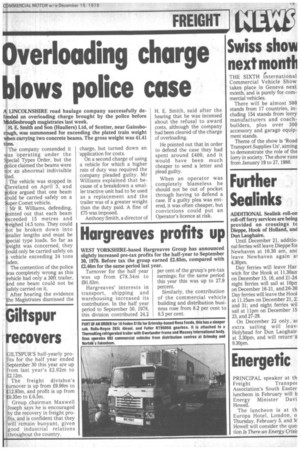Overloading charge blows police case
Page 21

If you've noticed an error in this article please click here to report it so we can fix it.
• UNCOLNSHIRE road haulage company successfully defended an overloading charge brought by the police before 11 iddlesbrough magistrates last week. H. E. Smith and Son (Hauliers) Ltd, of Scotter, near Gainsbor ugh, was summonsed for exceeding the plated train weight lAhen carrying two concrete beams. The gross weight was 41.41 t ns.
The company contended it v as operating under the St3 ecial Types Order, but the --)lice claimed the beans were Tipt an abnormal indivisible 1 ad.
The vehicle was stopped in leveland on April 3, and —31ice argued that one beam uld be carried safely on a uper Comet vehicle.
Mr R. Williams, defending, --ointed out that each beam xceeded 15 metres and reighed 14.5 tons. They could ot be broken down into maller lengths and must be pecial type loads. So far as Jeight was concerned, they ould only be carried safely on vehicle exceeding 24 tons aden.
The contention of the police vas completely wrong as this Tehicle had only a 30ft trailer, aid one beam could not be ;afely carried on it.
After hearing the evidence he Magistrates dismissed the charge, but turned down an 'application for costs.
On a second charge of using a vehicle for which a higher rate of duty was required the company pleaded guilty. Mr Williams explained that because of a breakdown a smaller tractive unit had to be used as a replacement and the trailer was of a greater weight than the duty paid. A fine of £75 was imposed.
Anthony Smith, a director of H. E. Smith, said after the hearing that he was incensed about the refusal to award costs, although the company had been cleared of the charge of overloading.
He pointed out that in order to defend the case they had spent around £400, and it would have been much cheaper to send a letter and plead guilty.
When an operator was completely blameless he should not be out of pocket through having to defend a case. If a guilty plea was entered, it was often cheaper, but convictions could put an Operator's licence at risk.




















































































































